Unit 1 Growing up第一课时 (21张PPT)教案导学案
- 格式:doc
- 大小:25.50 KB
- 文档页数:2
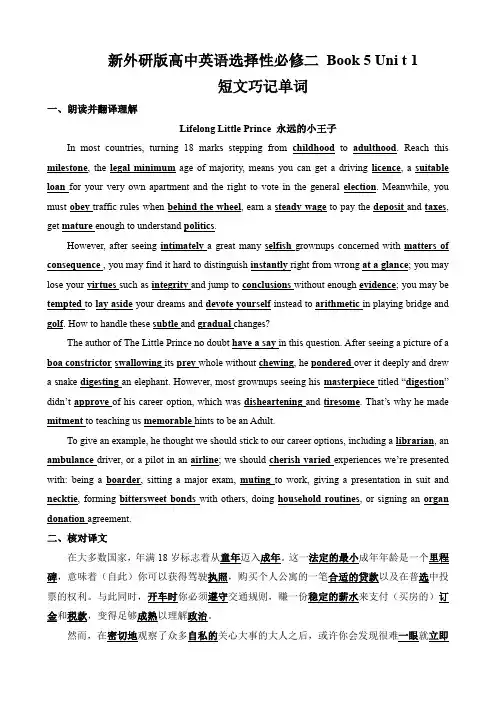
新外研版高中英语选择性必修二Book 5 Uni t 1短文巧记单词一、朗读并翻译理解Lifelong Little Prince 永远的小王子In most countries, turning 18 marks stepping from childhood to adulthood. Reach this milestone, the legal minimum age of majority, means you can get a driving licence, a suitable loan for your very own apartment and the right to vote in the general election. Meanwhile, you must obey traffic rules when behind the wheel, earn a steady wage to pay the deposit and taxes, get mature enough to understand politics.However, after seeing intimately a great many selfish grownups concerned with matters of consequence , you may find it hard to distinguish instantly right from wrong at a glance; you may lose your virtues such as integrity and jump to conclusions without enough evidence; you may be tempted to lay aside your dreams and devote yourself instead to arithmetic in playing bridge and golf. How to handle these subtle and gradual changes?The author of The Little Prince no doubt have a say in this question. After seeing a picture of a boa constrictor swallowing its prey whole without chewing, he pondered over it deeply and drew a snake digesting an elephant. However, most grownups seeing his masterpiece titled “digestion” didn’t approve of his career option, which was disheartening and tiresome. That’s why he made mitment to teaching us memorable hints to be an Adult.To give an example, he thought we should stick to our career options, including a librarian, an ambulance driver, or a pilot in an airline; we should cherish varied experiences we’re presented with: being a boarder, sitting a major exam, muting to work, giving a presentation in suit and necktie, forming bittersweet bonds with others, doing household routines, or signing an organ donation agreement.二、核对译文在大多数国家,年满18岁标志着从童年迈入成年。
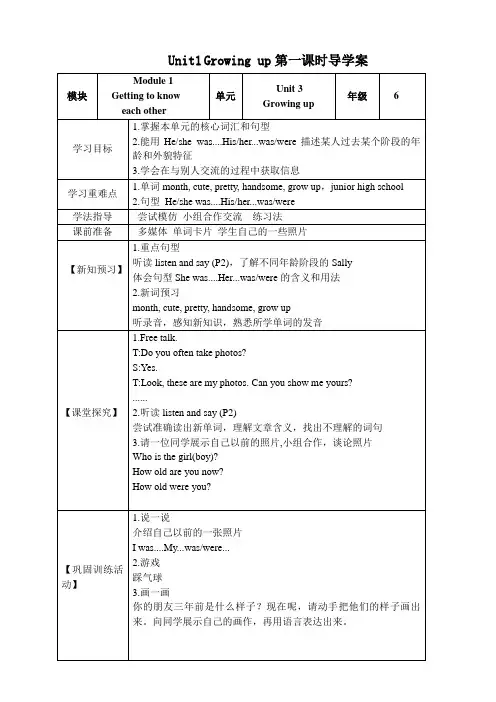
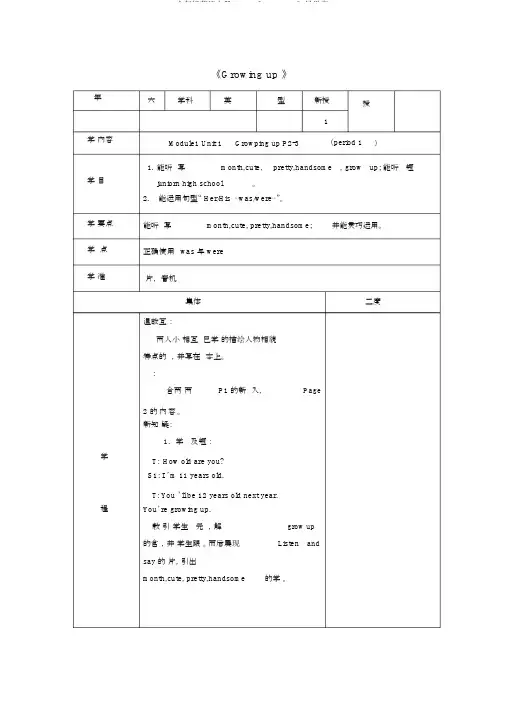
年学内容学目学要点学点学准学程《Growing up 》六学科英型新授授1Module1 Unit 1Growping up P2-3(period 1)1.能听写month,cute,pretty,handsome,grow up; 能听短juniorn high school。
2.能运用句型“ Her/His ⋯was/were⋯”。
能听写month,cute, pretty,handsome;并能灵巧运用。
正确使用was 与 were片,音机集体二度温故互:两人小相互已学的描绘人物相貌特点的,并写在本上。
:合两两P1 的新入,Page2的内容。
新知疑:1.学及短:T: How old are you?S1: I ’m 11 years old.T:You ’ll be 12 years old next year.You’re growing up.教引学生元,解grow up的含,并学生跟。
而后展现Listen andsay 的片,引出month,cute, pretty,handsome的学。
2.出示 Listen and say 的片,播放音,学生听看片。
3.再次播放音,教板中出的生 was 和 were, 通与 is和are比,帮助学生理解。
稳固:学生填空达成P3 中的反,并核学答案。
拓展延长:程达成两两中精要沟通中的三个。
Unit 1 Growing up(1)板Month cute pretty handsome grow upHer/His⋯was/were⋯He/She was/were ⋯ months/years old.学反省年学内容学目学要点学点学准学程堂教案六学科英型新授授2Module 1 Unit 1Growping up P4-5( period 2)1.帮助学生故事《小蝌蚪找》。
2.帮助学生稳固和合运用本元所学的知和技术。
Catch 的用法;能抓住故事中的关信息,认识故事粗心。
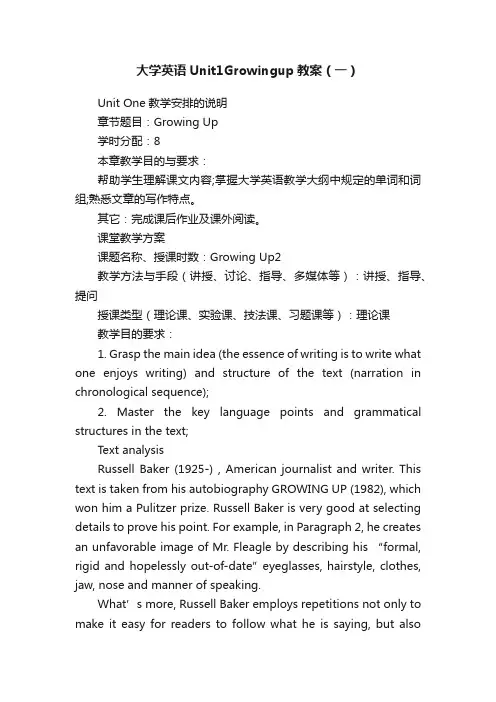
大学英语Unit1Growingup教案(一)Unit One教学安排的说明章节题目:Growing Up学时分配:8本章教学目的与要求:帮助学生理解课文内容;掌握大学英语教学大纲中规定的单词和词组;熟悉文章的写作特点。
其它:完成课后作业及课外阅读。
课堂教学方案课题名称、授课时数:Growing Up2教学方法与手段(讲授、讨论、指导、多媒体等):讲授、指导、提问授课类型(理论课、实验课、技法课、习题课等):理论课教学目的要求:1. Grasp the main idea (the essence of writing is to write what one enjoys writing) and structure of the text (narration in chronological sequence);2. Master the key language points and grammatical structures in the text;Text analysisRussell Baker (1925-) , American journalist and writer. This text is taken from his autobiography GROWING UP (1982), which won him a Pulitzer prize. Russell Baker is very good at selecting details to prove his point. For example, in Paragraph 2, he creates an unfavorable image of Mr. Fleagle by describing his “formal, rigid and hopelessly out-of-date”eyeglasses, hairstyle, clothes, jaw, nose and manner of speaking.What’s more, Russell Baker employs repetition s not only to make it easy for readers to follow what he is saying, but alsoimpress them more deeply. For example, in Paragraph 2, there are 9 prim’s or primly’s in as few as 3 sentences. Thus readers will have in their mind a vivid picture of what Mr.Fleagle looked like. In Paragraph 5, there are 5 I wanted’s. They help to emphasize Russell Baker’s strong desire to write for himself.On the other hand, Russell Baker is also expert in avoiding repetition by employing synonymous words and phrases. Here are some examples:a.dull, lifeless, cheerless, tediousb.turn out, write, compose, put downc.formal, rigid, prim, correct, proper, respectabled.recapture, relivee.pleasure, delight, happiness教学重点、难点:Word and Expressions:1.off and on: from time to time, now and again, irregularlyIt has been raining on and off for a week. That’s why the clothes feel damp.As her baby slept soundly, the mother was able to doze off and on in a chair.She managed to support herself by working on and off as a waitress.2.possibility: the state of being possibleIs any possibility of life on Mars?They haven’t arrived. There is a possibility that they have taken the wrong road. 3.take hold: become established The idea of one child only has taken hold in many Chinese families.O ld habits die hard. That’s why you should stop smoking before the habit takes hold.4.associate…with…:join or connect together: connect orbring to mindWe associate Egypt with pyramids.Jim wished to forget everything associated with his former life.People often associate the old days with good times, and seem to forget the hardship they suffered.5.turn out: produceNew computers are soon outdated since newer models are turned out constantly American film studios turn out hundreds of films every year.6.tedious:The movie was so tedious that many viewers left before it was over.Laura found George to be tedious and decided not to see him any more.7. anticipate: expectThey anticipate that the deaths from AIDS will have doubled by 2020.We anticipate running into problems in carrying out the medical welfare reform.The police had anticipated trouble from the soccer fans and were at the ground in large numbers.8. reputation:Premier Zhu Rongji has a high reputation as a statesman in the world.Jim Kerry has quite a reputation for being co9. inspire: fill somebody with confidence, eagerness, etcMartin Luther King, Jr’s speeches inspired people to fight for equal treatment of African Americans.The last leaf on the tree that never fell off inspired the dyingpatient with the will to live on.Mr. Green is very dull as a lecturer. He’s rigid and old-fashioned, and doesn’t have the faintest idea of how to inspire.10. rigid: fixed in behavior: based on correct or accepted rulesThe rigid headmaster would button up his clothes even on the hottest days.If he had been a little less rigid about things, his daughter would not have left home at such a young age.11. out-of-date: old-fashionedNew words are constantly added to our vocabulary while some old words go out-of-date.Although her clothes were out-of-date, the old woman appeared clean and dignified.12. severe: completely plain: stern, strict; causing great pain, difficulty, worryEarnest Hemingway is known for his severe writing styleOnly those who have undergone severe training can be accepted into air force.The severe chest pain experienced by the vice-president proved to be a heart attack.13. tackle: deal withThe classroom was quiet as students were busy tackling the final exam.Toshiba recently designed a robot that can tackle almost any kinds of housework.14. face up to: be brave enough to accept or deal with (a problem or difficulty)Now that your daughter is born, you’ll have to face up to the responsibilities of being a father.Yeltsin faced up to the fact that he was no longer fit for the Russian presidency and resigned on the New Year’s Eve.15. scan: look through quicklyThe banker scanned the financial section of a dozen newspapers over breakfast.Scan the book and tell me what it is about.16. image: a picture formed in mindMany pop stars try to improve their public image by participating in charity events.17. recall: bring back to the mind; rememberI can’t recall her name.I don’t recall ever meeting her.She recalled that she had to see the doctor again that afternoon.The policeman asked the old lady to recall as much about the accident as possible.18. violate: act againstSpeeding in downtown areas violates traffic regulations.A country isn’t respected if it violates an international agreement.19. hold back: prevent the expression of(feelings, fears, etc. )People could hardly hold back their anger when they found that millions of dollars of public funds had been used to build luxurious houses for city officials.When I saw my little boy crying bitterly over the death of his pet dog, I could hardly hold back my tears.。
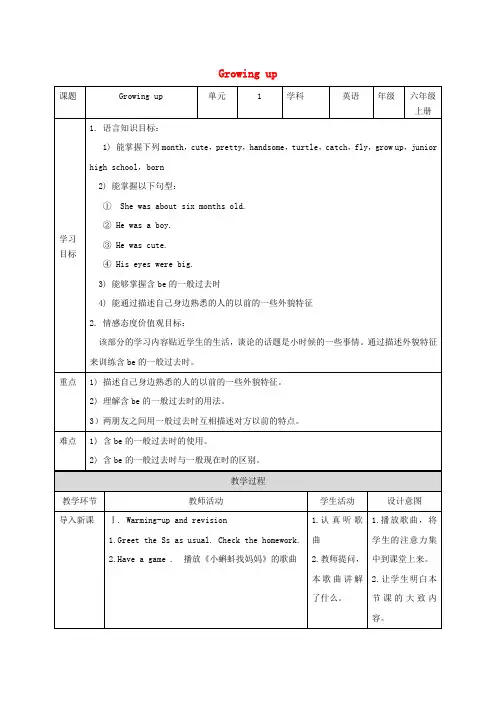
Growing up讲授新课 Ⅱ. Presentation 1.T: This is month. T his is cute …. This class, we'll learn something about growing up.(Show the pictures of the new words on the screen. Learn the meanings of the new words: month ,cute ,pretty ,handsome ,turtle ,catch ,fly ,grow up ,junior high school ,born)2.Work on Listen and say. Play the recording for the Ss to listen and repeat the new words. Ss read the new words and try to remember them.3.讲练结合。
Do you know Sally ?Complete the notes about the photos. 2·1·c·4. Ss read and try to remember the phrases. Ⅲ.Grammer.一般过去时:(1)定义:过去时间里发生的动作或者存在的状态(2)结构:主语+was/were+其他 含be 动词的一般过去时肯定式:主语+was/were+其他(am ,is 的过去式是was ;are 的过去式是were.) 例如:教师先领读,然后男生读,女生读,链式读,给出汉语说英语,给出英语说汉语,最后跟读正音。
紧凑的教学环节使学生能够全身心的投入学习中。
1.学生紧跟老师的讲解,熟悉并牢记一般过去时的表达结构式。
2.自己尝试用一般过去时来造句。
1.经过反复练习和学习,让学生以最快的速度轻松、愉快的掌握新单词。
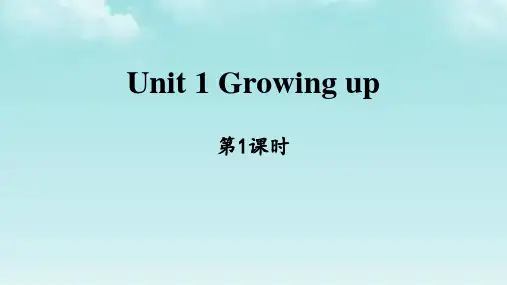
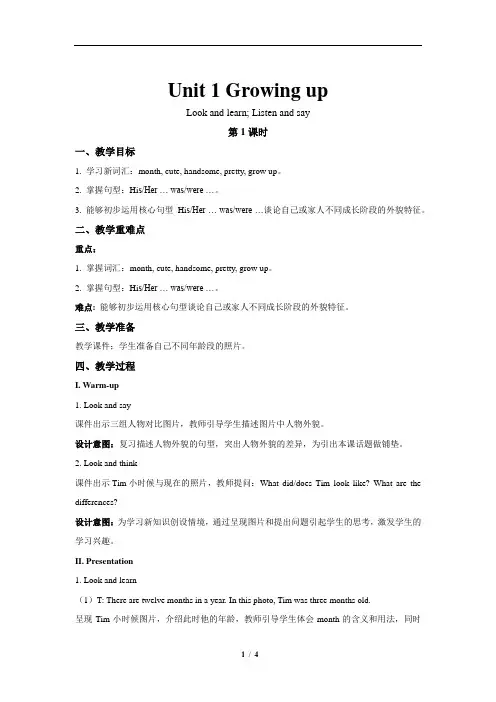
Unit 1 Growing upLook and learn; Listen and say第1课时一、教学目标1. 学习新词汇:month, cute, handsome, pretty, grow up。
2. 掌握句型:Hi s/Her … was/were …。
3. 能够初步运用核心句型Hi s/Her … was/were …谈论自己或家人不同成长阶段的外貌特征。
二、教学重难点重点:1. 掌握词汇:month, cute, handsome, pretty, grow up。
2. 掌握句型:Hi s/Her … was/were …。
难点: 能够初步运用核心句型谈论自己或家人不同成长阶段的外貌特征。
三、教学准备教学课件;学生准备自己不同年龄段的照片。
四、教学过程I. Warm-up1. Look and say课件出示三组人物对比图片,教师引导学生描述图片中人物外貌。
设计意图:复习描述人物外貌的句型,突出人物外貌的差异,为引出本课话题做铺垫。
2. Look and think课件出示Tim小时候与现在的照片,教师提问:What did/does Tim look like? What are the differences?设计意图:为学习新知识创设情境,通过呈现图片和提出问题引起学生的思考,激发学生的学习兴趣。
II. Presentation1. Look and learn(1)T: There are twelve months in a year. In this photo, Tim was three months old.呈现Tim小时候图片,介绍此时他的年龄,教师引导学生体会month的含义和用法,同时呈现介绍年龄的目标句型。
(2)呈现Tim小时候和现在的对比照片,引导学生体会cute和handsome的含义和用法,同时呈现描述人物外貌的目标句型。
(3)T: Now he is tall. He goes to junior high school.呈现Tim现在的照片,引导学生体会junior high school的含义和用法,同时呈现本课重点句型。
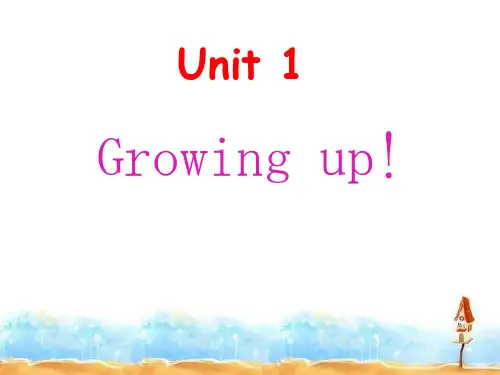
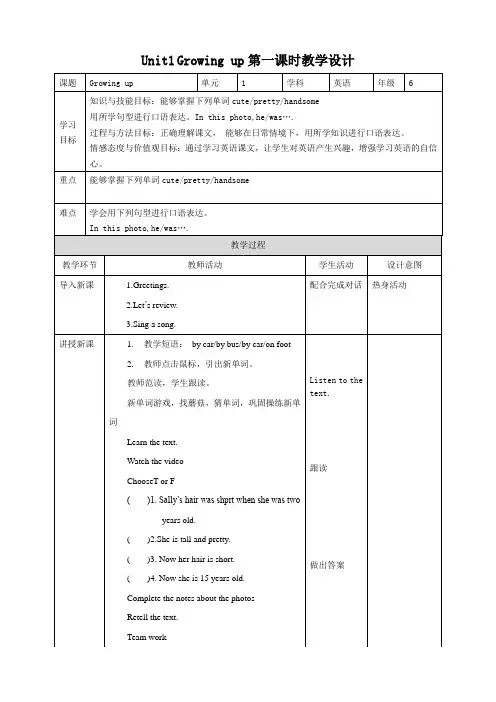
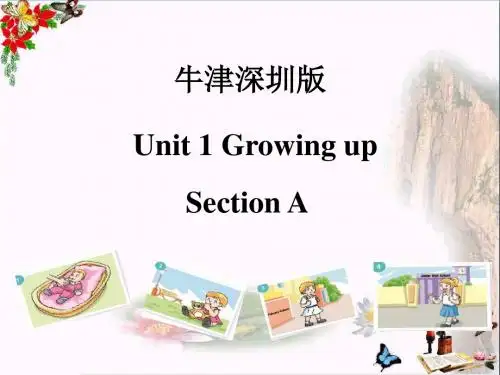
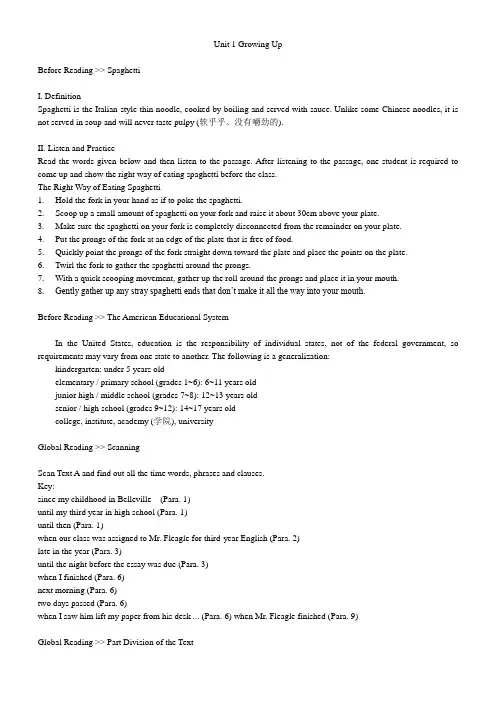
Unit 1 Growing UpBefore Reading >> SpaghettiI. DefinitionSpaghetti is the Italian-style thin noodle, cooked by boiling and served with sauce. Unlike some Chinese noodles, it is not served in soup and will never taste pulpy (软乎乎、没有嚼劲的).II. Listen and PracticeRead the words given below and then listen to the passage. After listening to the passage, one student is required to come up and show the right way of eating spaghetti before the class.The Right Way of Eating Spaghetti1. Hold the fork in your hand as if to poke the spaghetti.2. Scoop up a small amount of spaghetti on your fork and raise it about 30cm above your plate.3. Make sure the spaghetti on your fork is completely disconnected from the remainder on your plate.4. Put the prongs of the fork at an edge of the plate that is free of food.5. Quickly point the prongs of the fork straight down toward the plate and place the points on the plate.6. Twirl the fork to gather the spaghetti around the prongs.7. With a quick scooping movement, gather up the roll around the prongs and place it in your mouth.8. Gently gather up any stray spaghetti ends that don’t make it all the way into your mouth.Before Reading >> The American Educational SystemIn the United States, education is the responsibility of individual states, not of the federal government, so requirements may vary from one state to another. The following is a generalization:- kindergarten: under 5 years old- elementary / primary school (grades 1~6): 6~11 years old- junior high / middle school (grades 7~8): 12~13 years old- senior / high school (grades 9~12): 14~17 years old- college, institute, academy (学院), universityGlobal Reading >> ScanningScan Text A and find out all the time words, phrases and clauses.Key:since my childhood in Belleville (Para. 1)until my third year in high school (Para. 1)until then (Para. 1)when our class was assigned to Mr. Fleagle for third-year English (Para. 2)late in the year (Para. 3)until the night before the essay was due (Para. 3)when I finished (Para. 6)next morning (Para. 6)two days passed (Para. 6)when I saw him lift my paper from his desk ... (Para. 6) when Mr. Fleagle finished (Para. 9)Global Reading >> Part Division of the TextParts Para(s) Main Ideas1 1~2 Baker was bored by everything associated with English courses, including his new English teacher.2 3~5 Baker found himself attracted by one particular topic and wrote about it for his own enjoyment.3 6~9 The experience of writing the essay helped Baker discover his talent for writing and realize what he wished to do in life.Global Reading >> Further UnderstandingI. For Part 1 True or False1. Baker had never thought of becoming a writer until he was in the eleventh grade. (F)(As a child in Belleville, he had thought of becoming a writer from time to time.)2. Teachers found it painful to read st udents’ long and lifeless essays. (T)3. Before Mr. Fleagle became the English teacher for Baker’s class, the English course had been interesting. (F) (From the words “another cheerless year” we can see the English course had been quite boring.)4. In Bake r’s opinion, Mr. Fleagle was really a formal, rigid and out-of-date teacher only because of Fleagle’s manner of speaking. (F)(Besides the manner of speaking, Fleagle’s appearance and dress also showed that he was a dull and rigid teacher.)II. For Part 2 Multiple ChoiceChoose the best answer to complete the sentence.1. At first, Baker thought Mr. Fleagle’s English course was ___________. (B)A. interestingB. dullC. hopefulD. attractive2. In Baker’s opinion, the title of the composition “What I Did on My Summer V acation” was _________. (D)A. dullB. unfruitfulC. difficultD. foolish and dull3. Baker liked to write a composition with the title “The Art of Eating Spaghetti” because __________. (D)A. neither Baker nor Doris had ever eaten spaghetti beforeB. Baker and Doris argued about it at a supperC. spaghetti was from Italy and quite new thenD. it reminded him of the pleasure of that evening4. Which of the following statements is TRUE? _________ (A)A. Y ou’ll not write a good composition until you like the topic.B. When Baker wrote the essay, he thought his teacher would like it.C. Mr. Fleagle had liked Baker’s compositions before.D. Baker succeeded in writing two compositions.III. For Part 3 Questions and Answers1. Do you think Baker would write another essay if he had enough time? Why?2. What was Baker prepared for when he found all the papers had been given back but his?3. Whose essay did Mr. Fleagle read to the class? How did the class respond?4. Which paragrap h in this part gives readers the impression that Baker’s essay was very good?5. Why did Baker feel so delighted?Detailed ReadingI. Difficult Sentences1. Until then I’d been bored by everything associated with English courses. (Para. 1)What can we infer from this sentence? (Up to then, Baker had had no interest in things related to English courses.)2. I hated the assignments to turn out long, lifeless paragraphs that were agony for teachers to read and for me to write. (Para. 1)Paraphrase the sentence.(I found it painful to write long, boring essays as required by teachers; neither did teachers enjoy what I wrote.)3. another cheerless year in that most tedious of subjects (Para. 2)What can we learn from this phrase?(We can know from this phras e that before Mr. Fleagle became Baker’s English teacher, all English courses were dull.)4. I prepared for an unfruitful year with Mr. Fleagle and for a long time was not disappointed. (Para. 3)What does the author really mean when he says “I ... was not disappointed”?(He means that his expectation was right that Mr. Fleagle’s lessons were dull.)5. I took the list home and did nothing until the night before the essay was due. Lying on the sofa, I finally faced up to the unwelcome task, took the list out of my notebook, and scanned it. (Para. 3)1) What can we infer from these sentences?(Baker was unwilling to write his essay.)2) List phrases to support your inference.(did nothing until … the essay was due; faced up to the unwelcome task.)6. This title produced an extraordinary sequence of mental images. (Para. 4)Paraphrase the sentence and translate it into Chinese.(At the sight of the title I saw an unusual series of pictures in my mind’s eye. 这个题目在我脑海里唤起了一连串不同寻常的图像。
《Growing up》讲义Module 1 Getting to know each other, Unit 1 Growing up**一、课程导入**同学们,咱们现在都是六年级的大孩子啦。
今天咱们要一起聊聊成长这个超级有趣的话题。
我先给你们讲个我小时候的事儿。
我小时候特别害怕上学,每天早上都要妈妈催好多遍才肯起床。
有一天,我就想啊,要是我能一下子就长大,就不用上学了。
可是呢,真的慢慢长大后,我才发现,成长可不仅仅是身体长高这么简单的事儿。
**二、什么是成长(知识点1)**1. **身体的成长**- 咱们从出生到现在,身体一直在变化。
就像你们看自己小时候的照片,是不是觉得那时候自己小小的,胳膊腿儿都短短的。
现在呢,咱们的身高变高了,力气也变大了。
比如说,以前可能拿不动一桶水,现在有的同学就能帮忙做一些力气活了。
这就是身体成长的一部分。
而且啊,我们的身体还会继续成长呢,一直到咱们成年。
- 在成长的过程中,我们还会换牙。
这是很有趣的一个过程。
我记得我换牙的时候,有一颗牙松了,我老是忍不住用舌头去顶它。
有一次,在吃饭的时候,那颗松松的牙突然就掉了,可把我吓了一跳。
不过后来发现,换牙是很正常的事情,新长出来的牙会更坚固呢。
2. **心智的成长**- 除了身体,我们的心智也在成长。
心智就是咱们心里想事情的方式。
比如说,以前你们可能看到一个玩具就想要,不管爸爸妈妈有没有钱。
但是现在呢,很多同学就会考虑到爸爸妈妈赚钱不容易,不会随便要东西了。
这就是心智成长的表现。
- 还有啊,在学校里,以前咱们可能一和同学闹别扭就哭鼻子或者动手。
现在呢,我们会试着去和同学讲道理,去解决问题。
我就见过这样的例子,有两个同学在课间因为一本书争了起来,一个说自己先拿到要看的,另一个说自己也想看。
要是在以前,可能就会抢起来。
但是这一次呢,他们俩互相商量了一下,决定一起看这本书,一个人看一会儿。
这就是心智成长带来的变化。
**三、成长中的变化(知识点2)**1. **兴趣爱好的变化**- 随着我们的成长,兴趣爱好也会变。